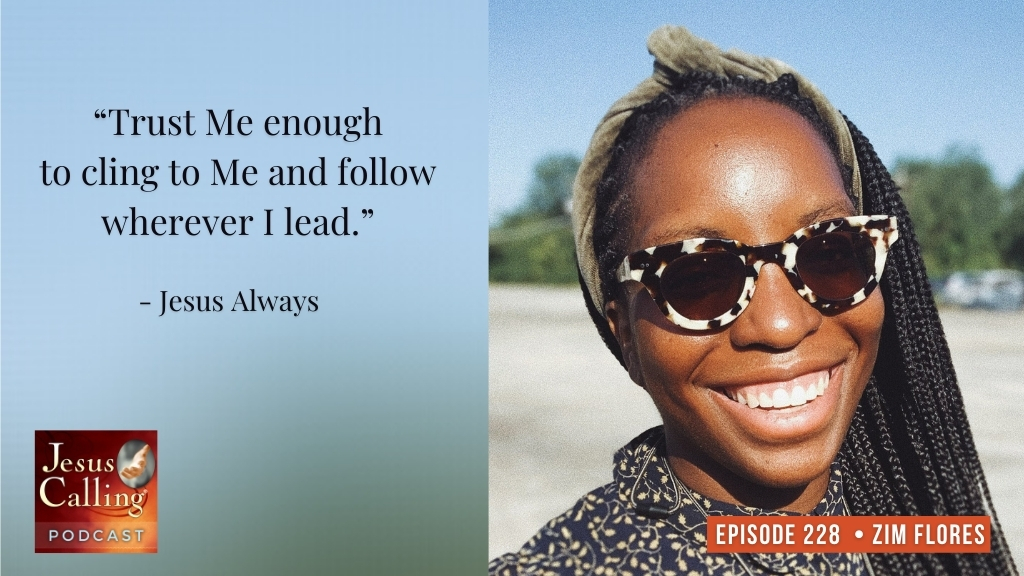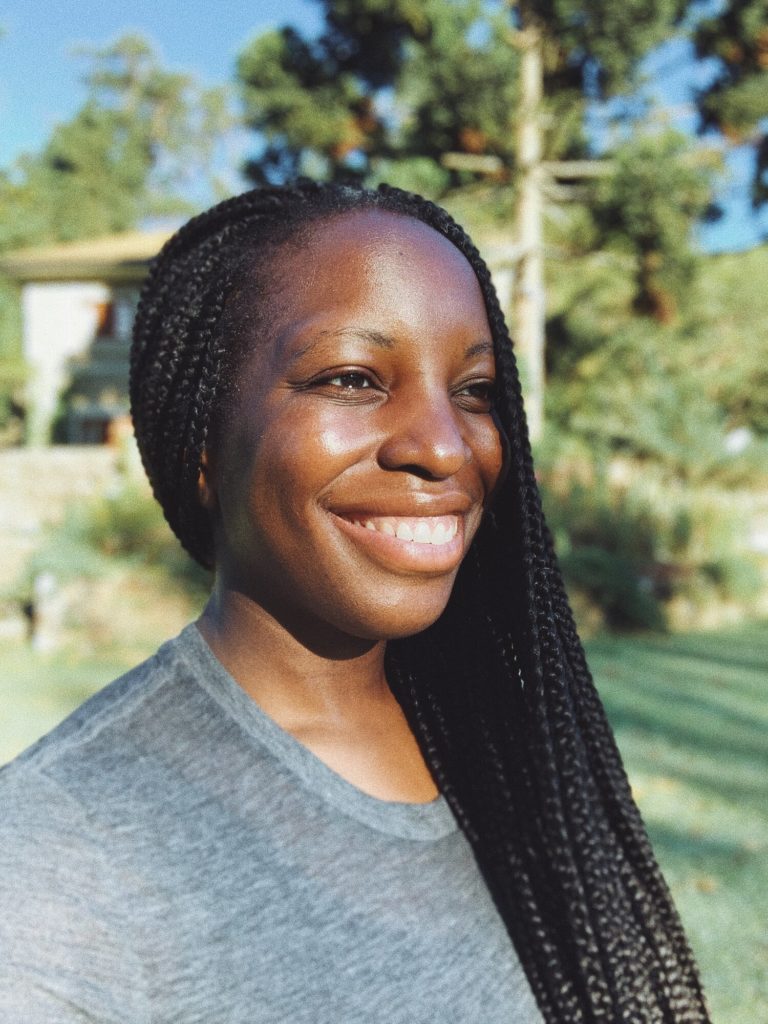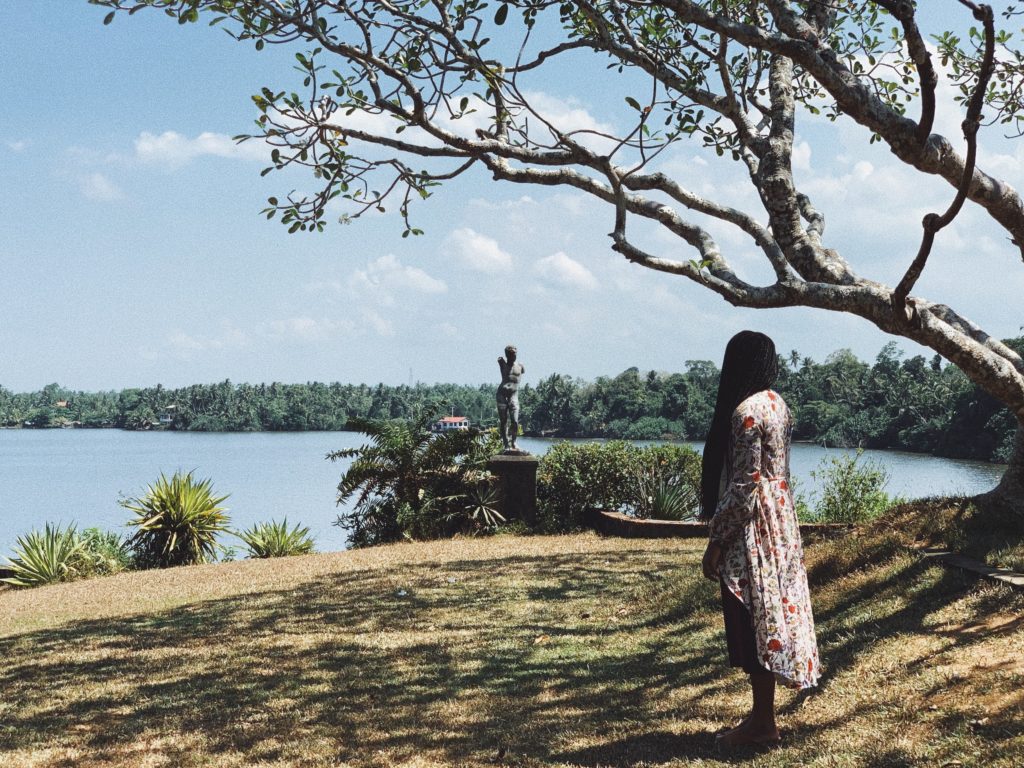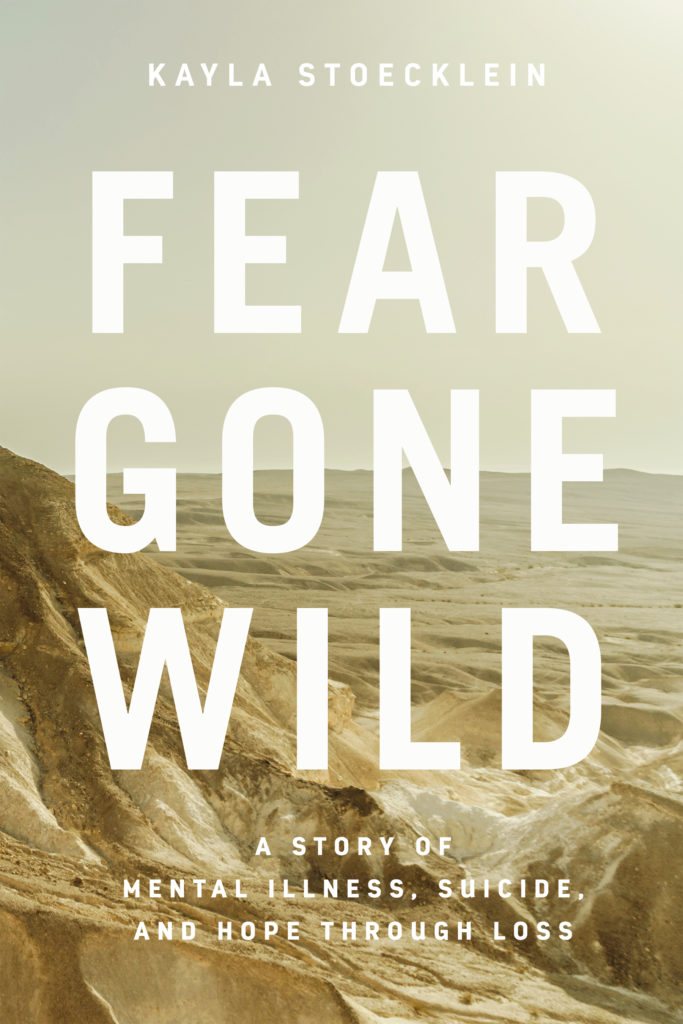Painful Endings and New Beginnings: Zim Flores & Kayla Stoecklein

Zim Flores: The Bible says that perfect love casts out all fear. And if I know that God loves me and I know that God has my back, then I can go into each season knowing that there is something, there is a new lesson, there is a new blessing for me there, and this kind of risk-taking is still within the boundaries of God. And that’s the safest place to be.
Painful Endings and New Beginnings: Zim Flores & Kayla Stoecklein – Episode #228
Narrator: Welcome to the Jesus Calling Podcast. Sometimes we go through seasons of loss where we are required to let something go. And sometimes the things—or people—we hold dear are seemingly ripped away from us. Our guests this week have experienced both kinds of losses and are here to encourage us that there is more to the story after a loss, and that we can trust that God is leading us to exactly where we need to be: writer and entrepreneur Zim Flores and author and mental health advocate Kayla Stoecklein.
Zim Flores had entrepreneurship modeled to her from an early age starting with her Nigerian grandmother. Zim’s mother followed a similar path as she came over to America—instilling the importance of education and a sense of adventure in Zim and her brother. Zim took that spark and before her twentieth birthday had accomplished feats that many don’t reach in a lifetime—including cloning a gene with similarities to a genetic disorder and becoming the youngest precinct judge for the state of North Carolina. Zim went on to found a highly successful travel company that became a huge part of her identity, until she felt God telling her to give the business up and she found herself on a journey to find out who she really was, apart from what she had built. She shares about this journey in her new book, Dare to Bloom.

Zim: So my name is Zim Flores. I am an entrepreneur. I’m a traveler. I’m a speaker and an author. I live in Chicago with my husband, and together, we own quite a few different businesses, all in different industries. But I got my start in entrepreneurship with a travel company that I started in 2013. And one day I felt the Lord kind of nudging me to give it all up. And so I went on this really wild, interesting, painful, challenging journey that kind of led to writing this new book.
The book is called Dare to Bloom. And it’s about trusting God through new beginnings and painful endings. And it was born out of this period of my life where I had given up this, you know, really successful business. And I sold it.
I had spent all of this time tying my identity to this business that when the business was no longer there, I almost fell into this identity crisis. I think a lot of us, as we think about who we are, we kind of place these tent poles with other people, or we place these tent poles with the towns that we grew up in or the jobs that we have or how much money we own or all of these different things, that when those things go away, it’s really hard for us to grasp who we really are.
The Roots of Knowledge: Education
So my grandmother, she is in her nineties now. She lives in a small town in eastern Nigeria, the feistiest woman you’ll ever meet. She was an entrepreneur. She had several businesses. She lost her husband in the sixties, so my mom’s father died during the Biafran War and she had to raise all of her kids by herself. So they lived first in this mud house, and then kind of transitioned to another smaller house that had a more solid structure.
My mom grew up thinking that education was something that was really important. It was something that she was always striving for, because she knew that it was the only way to get out of where she was, right? In order for her to get out of poverty and to be able to get to America or other parts of the world, she had to start thinking about education and what that looked like.
And so my uncle, who sadly passed away in a plane crash in 2000, was the champion for our entire family. So he was the oldest of everybody and made sure that everybody got an education. And my mom was no different. So she got an education. She was able to climb through the ranks. She ended up marrying my father in an arranged marriage, didn’t know him too well, but he was in the States. So what that meant was my mom had an opportunity to go to the States. Landed in the United States in the early eighties, all alone in Minnesota, of all places, to go from eastern Nigeria to Minnesota, so the first year or so was really challenging. .
A Mother’s Tough Decision
My father ended up being abusive. She didn’t know anybody. Minnesota doesn’t really have, you know, a diverse population, especially in the early eighties. She was all alone.
And so my brother came in 1986. I came in 1988. And one day in the early nineties, late eighties, early nineties, my mom stumbled across my father’s gun. My father would do these frequent trips back and forth to Nigeria. And one of those trips, my mom said, “That’s it. I’ve had enough. I am going to pack everything up and we are going to get out of here.”
So she packed us up, put us on a Greyhound, and we went over to California. We had one cousin at the time in the entire United States. And we stayed with him while things got settled.
[My father] ended up leaving America and going back to Nigeria. And eventually we came back to Minnesota and we started our life again.
Faith & Freedom to Explore New Paths
We grew up in a small town in Minnesota called Rochester. It’s where the Mayo Clinic is. And so we did a lot of exploring and wandering around and hanging out with our motley crew of church friends. So I grew up going to church multiple times a week,
Faith and the church played such a role in [my mom’s] healing and in her support system that it was all that I knew growing up. Growing up, all of my friends were from church. I have very fond memories of being at the home of our pastors. And it was something that was important to me, and so my mom, as a nurse—my brother and I had to spend a lot of our time after school and getting ready in the morning by ourselves because our mom would work twelve-hour shifts. So we grew up to be quite independent.

I was a pretty big thinker. I went off to college. I ended up cloning a gene when I was nineteen years old. And I toured around the country talking about my research with my best friend. We started an anti-tobacco organization. We were the youngest in the country. And we traveled around to talk to young people about the ills of tobacco and about the evils of smoking. And in addition to that, I worked to open up an international civil rights museum. So I started an organization to do that. And so I spent a lot of time with communities and working in communities and listening to their stories.
And one of the things that was really impactful now that I think about it growing up, I was able to move in between different circles. So I started in Minnesota in a community that didn’t look like me, but I moved into a new community that looked like me, but I still felt like I was an outsider to them going to high school and then going to this middle school that was an art school. And so I had all of these experiences where I was like an insider at some points and an outsider at other points. And that allowed me to be able to move in and out of different circles as I kind of grew up and grew older.
A Strengthening Of Faith
There was a period of my life where I wasn’t always in church. I was there, but I wasn’t there. I was like the equivalent of being like a lukewarm Christian, if you will. But I’ve always tried as much as I could to stay in church.
So right after I graduated college, I sold everything that I owned and I moved to India. And I was there working in Bangalore, I learned Hindi. To this day, I can still read and write and speak it. And I didn’t have a church there because, one, it’s pretty tough to find a church in India. They’re predominantly Hindu. They’re Muslim. There are pockets of Christianity in certain places, but it was generally pretty hard to find a place that really resonated with me. So I started watching church online with the church that I had gone to in college and I started journaling. I started spending time with God alone. And I think it was [in India], that outside of the confines and outside of the structure of church, I started to really cultivate a personal relationship with God, which I think is important for everybody to do. And in doing that, I realized as I left India, as I moved to all the places that I moved to after I left and and finally landing in Chicago, that it almost seemed rare for somebody who had this success to very to be very outspoken about her relationship with God, or at least it felt that way.
When we think about the transforming nature of God and who He is, He really does change every part of our lives. And if He does change every part of our lives, then when we talk about any part of our lives, He should naturally be a part of it. So I don’t necessarily think that it’s—I don’t know. I don’t think that it should be something that is a rarity for women and men of God to talk about God in a way that inspires people to think a little bit differently about God in their own lives. Is He something that you just talk about on Sundays or Wednesdays? Or is He something that really, truly permeates through every aspect of your life where it is undeniable that whatever happened to you today was God.
“I don’t think that it should be something that is a rarity for women and men of God to talk about God in a way that inspires people to think a little bit differently about God in their own lives.” – Zim Flores
So I would say that my time in India being away from everything that I knew, everybody that I knew, speaking a different language completely, that was where my faith in God was strengthened.
“I would say that my time in India being away from everything that I knew, everybody that I knew, speaking a different language completely, that was where my faith in God was strengthened.” – Zim Flores
Giving Something Up to Gain More

I had an interview maybe a month and a half ago, and the interviewer said this to me. He said, “You gave up a company, but God gave you an empire.” And I think about Travel Noire and having to give it up, but I think about what I’ve been able to gain as a result, right, that God has allowed for our businesses to prosper. That He is really, when we think about it, the vine dresser.
So I think about the scripture in John 15 that talks about how God will prune even the things that bear fruit so that they may bear fruit more abundantly. And so even though my time with Travel Noire was cut off, God—it wasn’t a bad thing, right? It was blooming. It was doing all of those things. But God had to trim and prune that branch so that more could grow abundantly. And so I look at my life now and I look at my life then and think about how much I’ve grown and how much God has blessed us with. And I want to remind everybody that’s listening here that your sacrifice unto God is not for naught. He will honor that sacrifice, whether it is tomorrow, whether it’s next month, whether it’s five months or a year from now. God always makes good on His promises. And so that process for me just completely changed my life.
“Your sacrifice unto God is not for naught. He will honor that sacrifice, whether it is tomorrow, whether it’s next month, whether it’s five months or a year from now. God always makes good on His promises.” – Zim Flores
I think that there is a period of time where we have to get to the basics. What is it that God is trying to teach us? What is it that He’s trying to tell us? Is there something that we need to be focusing on that we’re not focusing on now? And how can we spend more time with God in this season? How can we pray more? How can we fast more? How can we stay in tune with His word? How can we stay in His will? So every time we are in these kinds of transition phases, we shouldn’t just look to the people that are closest to us to tell us what we need to do next. We should also, firstly, go to God and ask Him what He thinks.
Prayer is something that brings us closer to God. It allows for us to have a connection with Him. And whatever God does for us and with us is always for our good and for learning. And so I’m praying for a revival of repentance and I’m praying for the people who have been sleeping on their post, who have been called to be used of God, but perhaps got distracted this year. I’m praying for a hunger in this generation for the things of God. I’m praying for unity in the spirit.
And so I think for the coming year, how I’m looking to bloom, I just want to be used of God. And however He sees fit for doing that, I am an open vessel. I think the best thing that we can be for God is available. And if we are available and we’re not too busy and we’re not too tied down, we’re not listening to all the news and we’re not reading all the politics and all those things or really available to God, I think that’s when He can use us the most.
“I am an open vessel. I think the best thing that we can be for God is available.” – Zim Flores
Narrator: Zim’s new book, Dare to Bloom, is available wherever books are sold.
Stay tuned to Kayla Stoecklein’s story after this brief message.
This Christmas, there’s a gift you can give that will inspire and encourage those you love all year long! With the Jesus Calling books for adults and kids, you can be sure the gift you’re giving will help the receiver strengthen their relationship with God in the new year.
Now until December 24, 2020, you can get 40% off all Sarah Young books for adults and kids at your favorite Parable store and online at parable.com. This includes Jesus Calling, Jesus Always, the new Jesus Calling Note-Taking Edition, and so many more titles. Don’t miss the chance to give a fresh start to those you love with the Jesus Calling family of books, 40% off for a limited time. Visit parable.com for more information.
Narrator: Our next guest is speaker and mental health advocate Kayla Stoecklein. As the pastor of a megachurch in California, Kayla’s husband Andrew carried the weight of the world on his shoulders, and Kayla walked with him during this stressful season and watched as Andrew’s mental health deteriorated, and the depression he struggled so bravely against ultimately led to a tragic outcome.
Instead of hiding away from the circumstances, Kayla decided to be transparent and vulnerable about Andrew’s story, and her own, in the hopes that a candid, ongoing conversation surrounding mental health could bring understanding and sense of hope to those dealing with mental health issues in their own lives, or in the lives of the people they love.

Kayla Stoecklein: Hi, my name’s Kayla Stoecklein. I am a single mom of three young boys, they’re seven, six, and four. I’m also a recent widow. A few years ago, my husband passed away, and I’m now an author and I’ve written my first book. It’s called Fear Gone Wild: A Story of Mental Illness, Suicide, and Hope Through Loss. And I’m raising my three boys by the beach in Southern California.
Falling In Love with Andrew & Ministry
So Andrew and I met, it was my sophomore year of college, it was his junior year. We went to this little Christian college in Costa Mesa, California, called Vanguard University.
We dated for a year, got engaged, were engaged for a year, and then got married in December 2010. And we really were just on the fast track from our very first date. We jumped right into ministry, full-time ministry, and we loved it. I loved being [Andrew’s] wife. I love doing ministry with him. It was such a beautiful life.
“I loved being [Andrew’s] wife. I love doing ministry with him. It was such a beautiful life.” – Kayla Stoecklein
When Andrew was three years old, his parents started the church called Inland Hills Church, and they went door to door with little bags of candy and invited people at a church and people showed up. And so the church grew and thrived and moved from a high school gym to an actual building. And it grew to a church of about 4,000 people and a staff of about thirty-five people and so [it was a] large, thriving, growing church. His dad was the pastor all the way through.
My husband, after he graduated from college and after we got married, we kind of went off on our own little adventure. We went to Seattle and he was a high school pastor, did student ministries for a little bit. And right away we kind of knew that it wasn’t that it was temporary, wasn’t a permanent move. And so after about six months, we moved back to California and my husband started working at his parents’ church as the creative arts director. And just a few months into that role, his dad, who was the lead pastor, was diagnosed with leukemia. So Andrew really stepped up to the plate and was basically leading the church with his dad at twenty-three years old.
And it was a four-year journey with leukemia and there was remission and relapse, remission and relapse. And it was a very difficult time for our church as they watched my father-in-law go through this battle. And it was during that time that our family adapted this phrase, God’s got this. And it was from that little hospital room that my father-in-law said those words, that he has leukemia, and it’s the kind that you don’t want, and no matter what, God’s got this. And so that kind of became our anthem in that season.
My husband became the lead pastor of the church. And just a few months later, his dad passed away in October of 2015.
A Chaotic Season
The church was very supportive of the transition, you know, Andrew had stepped up to the plate so much during the leukemia journey and he really had proved himself, that he was capable of doing the job, that he was equipped to do the job, that he could give compelling messages, that he could lead the staff.
Andrew never stopped. Andrew was driven. Andrew was called. After his father passed away, He only took a two-week break and then he came back to work and delivered this powerful series on heaven. His heart was for the local church. He wanted to lead them through their pain, and he kind of put his own pain to the wayside in order to lead the church through theirs. So he was loved. He was called. He was equipped. He was driven. And he was handling it really well. And he was excited for where he wanted to take the church. He was full of vision. He was so excited for the future.
And so he was welcomed with open arms as the lead pastor. But it was quite a bit of responsibility at a very young age. He was only twenty-six years old, almost turning twenty-seven when he was handed the baton. And we had a very young family. We had two young boys at the time, and I was pregnant with our third boy.
Through a couple of years, two or three years, I would get up at 4:00, 4:30 in the morning. I was in a really chaotic season when my boys were really young, they were like little babies—a baby, a two year old and a three year old—and I would get up really early in the morning and have that quiet time with God. And I really felt like every time I opened Jesus Calling that the words were for me.
I would sit at the kitchen counter and I would open up my Jesus Calling devotional and sit there and read the little devotional and look up the scriptures and journal. And it was just this really peaceful time for me.
Fear Creeps In
So it was in the fall of 2017 that things began to shift. We had a stalker issue in our family that really was this biggest invitation for fear from my husband. And so this fear began to creep into our home and it manifested itself in panic attacks. And so Andrew was having panic attacks about two to three times a week. It would spread throughout his body and he would be trembling. He would be pacing. He would be crying. He would be absolutely overcome with fear. And it was really scary.
We were seeing doctors. We were trying to get to the bottom of where they were coming from and what was going on and what was causing them. He was wrestling with those panic attacks, but he was pushing through them. He was showing up to work on Sunday. There were a few Sundays where he had a massive panic attack right before he was supposed to go on stage. But he went on stage anyway and delivered a powerful message. And then it was in April that he had a final massive one, I called the doctor and said, “You know what, enough is enough. What do I do? We can’t keep living like this.”
And he decided to go on a very unexpected sabbatical. And we were super honest with the church. The board of directors went on stage and told the church that, “Andrew’s been struggling with anxiety, he’s been struggling with panic attacks, and he just is going to take some time off to rest.” There was no timeline on it. We didn’t put an end date on it. We really just told him, “You can take as much time as you need. You have stepped up to the plate. You have let our church through so many trials, through so much pain, through the loss of your dad, take as much time as you need.” And the church was so receptive of that. And so a few weeks into his sabbatical, we went to see a psychiatrist and it was at that appointment that my husband was diagnosed with depression.
And so we really started on this journey with depression and he was given medication. We started seeing therapists. He would go on solo trips by himself to rest and spend time with God. He went on the trip to go spend time with a mentor in Colorado. We did a two week road trip, just the two of us, to go spend time together and work on our marriage. And Andrew really just was resting and trying to take the time seriously and was reading and resting and exercising. And we really were doing everything we knew to do to get him better.
A Devastating Loss
In August of 2018, the doctors actually thought that the next step for Andrew would be to return to work. He hit the ground running and he gave two powerful messages on mental illness. He was talking about depression, he was talking about suicide.
He was being very vulnerable and very honest with his own struggles. And the church, again, was so receptive. I mean, they gave him a standing ovation on his first Sunday back. The church was packed out. People were sitting on the floor. They were so eager and so excited that Andrew was back on stage, and they wanted to hear what he had to say.
Andrew told our staff and told our family that he was at about sixty-five percent. He was hoping to ease back into ministry and ease back into his responsibilities, and over time kind of step back into that role as the lead pastor. The doctors and our family and the church were so hopeful that he would get there.
And so headed into the third week, he had had his message prepared for Sunday. And he really felt like God had put this message on his heart for the weekend. And so on Thursday of that week, he went to the office and just had a really, really bad day at the office. He had a mental breakdown.
And we quickly realized, like, Maybe he isn’t even at sixty-five percent. Maybe he needs to take a couple steps back. Maybe he shouldn’t speak this weekend. And so the next day while we are away from him for just a little bit, making phone calls, scheduling a guest speaker for Sunday, he attempted suicide. And we were completely shocked, absolutely stunned. We knew that he wasn’t well, but we didn’t know that it was that bad. We really, truly believed that would never happen to him. He was rushed to the hospital and the doctors ran a bunch of tests and there was nothing that they could do.
And so on August 25th, 2018, Andrew died.
I was handed a brand-new life as a widow and single mom of three little boys, ages two, four, and five. And it was an absolute blindside that our church never saw coming, that our family never saw coming, and that the doctors never saw coming and that I absolutely never saw coming. Our church lost two lead pastors within just a couple of years. It was a very, very, very, very painful loss.
A Purpose in the Pain
So right away, our story went viral. Here’s this young pastor with this young family, good-looking guy, beautiful family, seemingly had everything he could have ever asked for and more. And he dies by suicide.
It just spread like wildfire all around the world. Our story and our family picture was on the news. And so I decided right away to share. I had posted a picture of him to Instagram while we were in the hospital, begging everybody we knew to pray. I really, truly believed with enough prayer, he wouldn’t die. I believed with enough prayer that God would intervene, that God would save [Andrew]. I was willing to do whatever it took to beg God for that miracle, and we didn’t get that miracle. And so it was important for me to not allow the suicide to define who Andrew was. Andrew’s life would be defined by the way he lived, not the way he died.
“I believed with enough prayer that God would intervene, that God would save [Andrew]. I was willing to do whatever it took to beg God for that miracle, and we didn’t get that miracle.” – Kayla Stoecklein
It was just three days after he passed away that I posted this letter that I wrote to him to our family blog, God’sgotthis.com. And in the letter I approached the suicide differently. I think oftentimes there’s so much shame and stigma with that word suicide. I think oftentimes the family that’s left in the shrapnel is afraid to say that word, is afraid to admit that it was a suicide and tries to hide it up or tries to cover it or thinks it’s their fault. And I knew right away that it wasn’t anybody’s fault.
“Oftentimes there’s so much shame and stigma with that word suicide. I think oftentimes the family that’s left in the shrapnel is afraid to say that word, is afraid to admit that it was a suicide and tries to hide it up or tries to cover it or thinks it’s their fault. And I knew right away that it wasn’t anybody’s fault.” – Kayla Stoecklein
And I still believe that today the suicide wasn’t Andrew’s fault. It wasn’t my fault. It wasn’t the doctor’s fault. I see the suicide almost as a tragic accident. I describe his death as being like a child drowning in a swimming pool at a birthday party. He was surrounded by people that left him, and he just slipped through our fingers.
I wrote him this letter and that letter went viral as well. And it was shared by a ton of people. And right away I saw the response from that one letter. People were emailing me. They were sending me letters in the mail. They were sending me messages on Instagram. And from that very first letter, God was up to something so much bigger than I could have ever imagined possible.
I was receiving letters from people that were saying things like, “Your public grief has saved my life. I was going to commit suicide. And I read the letter that you wrote to your husband, and I decided to stay.” “I’ve been struggling with depression, and I haven’t told anybody. And I checked myself into rehab this morning.” “I finally called the doctor and told them how bad my husband’s depression is.” “You gave me words on how to talk to my teenage daughter about their mental health.” Like, all these letters coming in, and I was absolutely blown away. And all of it just gave me motivation to keep sharing, to keep talking.
I heard the stories from people and God was on the move and He handed me this microphone, and I couldn’t look away. And so I kept sharing and I really, truly felt the presence of God like I had never felt in my entire life. It felt like God was in everything all the time. And it was so beautiful and it was so tangible.
“God was on the move and He handed me this microphone, and I couldn’t look away. And so I kept sharing and I really, truly felt the presence of God like I had never felt in my entire life.” – Kayla Stoecklein
And it was also so frustrating because as we walked through this season of mental illness with my husband, I was begging God for a miracle. I was begging Him to take the depression away. I was begging Him to take the anxiety away. I was begging Him for healing. And God was silent. It felt like God was silent. And then all of a sudden, Andrew dies and God is everywhere. And so it was so beautiful, but also so frustrating, but I just had to lean into that, and so I fell into the arms of God and just let Him lead the way and let Him open doors. And He opened doors left and right for me to share on stages that I never thought I would share. For me to write a book that I never thought I would write. He gave me language to talk about suicide that was healing and helpful for people.
No matter what we go through, we serve a God that’s sovereign, we serve a God that’s in control. We serve a God that can squeeze so much purpose out of our pain and that can turn really horrible, horrific, ugly things into beautiful redemption stories for others.
“We serve a God that can squeeze so much purpose out of our pain and that can turn really horrible, horrific, ugly things into beautiful redemption stories for others.” – Kayla Stoecklein
Reaching People In Their Pain
So when I knew that I wanted to share our story in written words in a book, I knew that I didn’t want the book to just be a sad story. I wanted it to be practical. I wanted it to be helpful. I wanted it to be something that people could refer back to and to share with other friends that are walking through it.
Throughout the book, it’s a little bit of our story and then it’s lots of practical tips and tools like, what do you do when someone’s struggling with depression? What do you do when someone’s struggling with anxiety and panic attacks? What do you do when someone’s telling you that they have thoughts of suicide? How do you respond? How do you love them? How do you show up? Who do you go to? Who do you talk to? And then what do you do for your friends who are grieving? And then what do you do when fear comes knocking at the door and starts invading your peace and invading your home? What do you do? And so I wanted to answer some of those ‘What do you do?’ questions.
And my heart is that it would reach into the depths of other people’s pain, maybe someone that’s walking through a season of mental illness. This book is for you. Or maybe if you’re walking alongside somebody who’s struggling with mental illness, then this book is for you. And my hope is that this book would be this practical tool that we can read and that would give us some better handles, some better handles to be love for people who are hurting.
Narrator: To learn more about Kayla’s new book, Fear Gone Wild, visit www.kaylastoecklein.com.
If you or someone you know has been dealing with thoughts of suicide, there is help. Please call the National Suicide Prevention line at 1-800-273-8255. That’s 1-800-273-8255.
If you’d like to hear more stories about dealing with loss, check out our interview with the founder of the Cookery, Brett Swayn.
Narrator: Next time on the Jesus Calling Podcast, we talk with Mike Weaver of the Dove Award-winning Christian group Big Daddy Weave. For years, the gifted and talented lead singer/songwriter struggled with seeing his worth, depending on others to define how he felt about himself. He shares the moment he realized that though we may feel we are defined by our mistakes, our true identity is made perfect by Christ’s love.
Mike Weaver: When God looks at us, He’s not looking at our mistakes. He is looking at what Jesus has done on our behalf and our identity. Our entire identity is rooted in not our imperfection, but the perfection of Jesus Christ applied to our life. That is the gospel.




